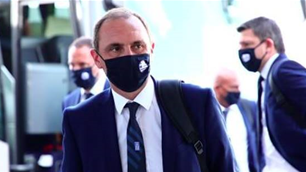Otto Rehhagel will be hoping his side can upset the odds once more this summer when he takes Greece to their first World Cup finals in 16 years.
The German secured legendary status in Greece when he led the national side to one of the biggest shocks in international football history by winning Euro 2004.
A 1-0 win over hosts Portugal in the final was enough for the 150-1 outsiders to claim their first international trophy. It has hardly been a case of plain sailing for 'King Otto' since his side shocked the world six years ago though.
The Greeks went into the 2006 World Cup qualifying campaign as favourites having been drawn against Ukraine, Turkey, Denmark, Albania, Georgia and Kazakhstan.
An embarrassing defeat to Albania and subsequent losses to Ukraine and Denmark made qualification impossible, but any notion that Rehhagel would quit after failing to reach the finals in his home country were swiftly dismissed.
Instead the German stayed on and navigated his team through a tricky qualifying group to reach Euro 2008, where they crashed out after defeats to Sweden, Spain and Russia.
Two years on and Rehhagel has put that disappointment behind him by realising his ambition of taking his adopted country to a World Cup finals.
Greece had to fight hard to make it to only their second World Cup, however.
In Group Two they could be sure of easy points against Luxembourg and Moldova, but Switzerland, Israel, and to a lesser extent Latvia would provide the Greeks with a much sterner test.
Rehhagel's team began their campaign with a 3-0 thumping of minnows Luxembourg before two goals from star striker Theofanis Gekas gave Greece a comfortable 2-0 win in Latvia.
The Greeks then made it three wins from three by brushing aside Moldova 3-0 at the Karaiskakis stadium in Piraeus.
Their campaign hit the buffers in October 2008 when Blaise Nkufo snatched a late winner for Switzerland to end Greece's 100% record. Gekas' stock continued to rise when he struck to keep Greece on top of the table with a 1-1 draw in Israel.
Celtic striker Georgios Samaras then gave Rehhagel's team a 2-1 win in the reverse fixture before a 2-0 defeat in Basle saw Switzerland displace the Greeks at the top of the table.
A damaging 1-1 draw in Moldova meant Greece dropped into third before a 5-2 mauling of Latvia, after four goals from Gekas, saw them move back into the play-off position.
A routine victory over Luxembourg sealed Greece's place in the play-offs, where they were given a tough draw against Ukraine.
The two sides played out a stalemate in Greece, meaning Rehhagel faced the daunting task of having to get a result at the Olympic Stadium in Donetsk.
Once again Rehhagel summoned his troops to overcome the odds and they duly delivered, with Dimitris Salpigidis grabbing the first-half winner.
Some had felt that Rehhagel's defensive tactics and open management style, often dubbed 'Ottocracy', would deny Greece victory. Match-winner Salpigidis was glad to have proved those critics wrong, though.
''It's a day of celebration for Greeks all over the world," he said following the win.
"All those people who have made negative comments during these past few days now have their answer from what we have done on the pitch.''
Rehhagel shows no signs of compromise in his defensive style ahead of the World Cup. He has vowed to stick to his 4-3-3/4-5-1 formation and still believes his solid defence is Greece's biggest advantage.
In Gekas though they have an outstanding striker who ended the qualification campaign with 10 goals - more than any other striker in the European qualifying zone.
They will have a tough task in overcoming Argentina, South Korea and Nigeria to make the second round, but the 2004 experience could see them upset the odds once more.
"Nobody expected us to do anything at the Euros in 2004 and we went out and won it," said captain Giorgos Karagounis.
"We beat Portugal, drew with Spain and lost to Russia, who were supposedly the weakest team and we then went on to win it.
"The least you can do is fight, and that's what we'll be doing out on the pitch."
As for Rehhagel, his tendency to avoid media exposure has left many unsure of his thoughts on Greece's chances of pulling off another shock.
What is certain is that, at 71, he will be the oldest manager in the tournament.
The competition could also be his last as manager, with the former Bayern Munich manager's contract due after the tournament.
Speculation is rife that he will leave his post after the World Cup has ended.
He knows a tough task awaits him in South Africa, but few would back against 'King Otto' pulling off one last upset in his historic reign as head of the national side.
A 1-0 win over hosts Portugal in the final was enough for the 150-1 outsiders to claim their first international trophy. It has hardly been a case of plain sailing for 'King Otto' since his side shocked the world six years ago though.
The Greeks went into the 2006 World Cup qualifying campaign as favourites having been drawn against Ukraine, Turkey, Denmark, Albania, Georgia and Kazakhstan.
An embarrassing defeat to Albania and subsequent losses to Ukraine and Denmark made qualification impossible, but any notion that Rehhagel would quit after failing to reach the finals in his home country were swiftly dismissed.
Instead the German stayed on and navigated his team through a tricky qualifying group to reach Euro 2008, where they crashed out after defeats to Sweden, Spain and Russia.
Two years on and Rehhagel has put that disappointment behind him by realising his ambition of taking his adopted country to a World Cup finals.
Greece had to fight hard to make it to only their second World Cup, however.
In Group Two they could be sure of easy points against Luxembourg and Moldova, but Switzerland, Israel, and to a lesser extent Latvia would provide the Greeks with a much sterner test.
Rehhagel's team began their campaign with a 3-0 thumping of minnows Luxembourg before two goals from star striker Theofanis Gekas gave Greece a comfortable 2-0 win in Latvia.
The Greeks then made it three wins from three by brushing aside Moldova 3-0 at the Karaiskakis stadium in Piraeus.
Their campaign hit the buffers in October 2008 when Blaise Nkufo snatched a late winner for Switzerland to end Greece's 100% record. Gekas' stock continued to rise when he struck to keep Greece on top of the table with a 1-1 draw in Israel.
Celtic striker Georgios Samaras then gave Rehhagel's team a 2-1 win in the reverse fixture before a 2-0 defeat in Basle saw Switzerland displace the Greeks at the top of the table.
A damaging 1-1 draw in Moldova meant Greece dropped into third before a 5-2 mauling of Latvia, after four goals from Gekas, saw them move back into the play-off position.
A routine victory over Luxembourg sealed Greece's place in the play-offs, where they were given a tough draw against Ukraine.
The two sides played out a stalemate in Greece, meaning Rehhagel faced the daunting task of having to get a result at the Olympic Stadium in Donetsk.
Once again Rehhagel summoned his troops to overcome the odds and they duly delivered, with Dimitris Salpigidis grabbing the first-half winner.
Some had felt that Rehhagel's defensive tactics and open management style, often dubbed 'Ottocracy', would deny Greece victory. Match-winner Salpigidis was glad to have proved those critics wrong, though.
''It's a day of celebration for Greeks all over the world," he said following the win.
"All those people who have made negative comments during these past few days now have their answer from what we have done on the pitch.''
Rehhagel shows no signs of compromise in his defensive style ahead of the World Cup. He has vowed to stick to his 4-3-3/4-5-1 formation and still believes his solid defence is Greece's biggest advantage.
In Gekas though they have an outstanding striker who ended the qualification campaign with 10 goals - more than any other striker in the European qualifying zone.
They will have a tough task in overcoming Argentina, South Korea and Nigeria to make the second round, but the 2004 experience could see them upset the odds once more.
"Nobody expected us to do anything at the Euros in 2004 and we went out and won it," said captain Giorgos Karagounis.
"We beat Portugal, drew with Spain and lost to Russia, who were supposedly the weakest team and we then went on to win it.
"The least you can do is fight, and that's what we'll be doing out on the pitch."
As for Rehhagel, his tendency to avoid media exposure has left many unsure of his thoughts on Greece's chances of pulling off another shock.
What is certain is that, at 71, he will be the oldest manager in the tournament.
The competition could also be his last as manager, with the former Bayern Munich manager's contract due after the tournament.
Speculation is rife that he will leave his post after the World Cup has ended.
He knows a tough task awaits him in South Africa, but few would back against 'King Otto' pulling off one last upset in his historic reign as head of the national side.
Copyright (c) Press Association
Related Articles

The former Socceroo, A-League star revamping Greek football

Meet Australia’s talented Haris Stamboulidis













